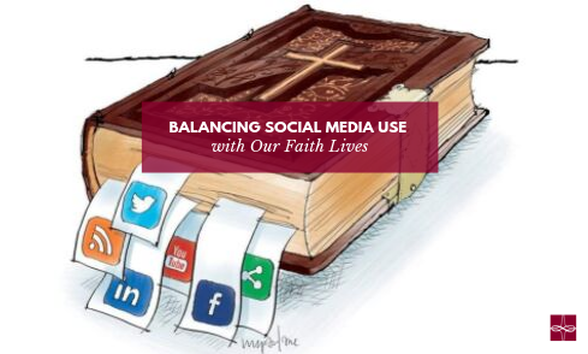|
As a communications manager who handles the social media accounts for my day job, I’ve had to work at and learn how to better manage my time spent on social media. While this technology is an exciting and ever-evolving resource for sharing and obtaining news, I’ve found social media can also drain my energy or keep me from my priorities. Within the last year, I noticed I was spending four or more hours a day on social media and browsing the Internet. I saw my spiritual life was being affected, so during this past Lent, I decided to do something about that imbalance. I knew I still needed social media for work use, and I discovered a solution. By implementing the screen time and do-not-disturb settings on my phone, I found I could limit my social media consumption to an hour per day. Whatever time was left after work allocations I could spend on personal social media time. Most days I used 45 minutes or the whole hour for work. I came to appreciate that my time was spent elsewhere in a more productive manner. I used the time for additional prayer, reading, church, conversations with friends, and other enjoyable activities. My brain didn’t feel as fuzzy and scattered with random bits of information that would send me off the paths toward my personal, professional, and spiritual goals. After Lent, I took off the screen time and do-not-disturb parameters on my phone due to an evening work event. Since then, I’ve turned them back on. This experience of self-reflection and adjustment of my behaviors reminded me of why God provides us with commandments: to set us free from sin in order to allow us to become more perfectly the people he created us to be. By growing in self-awareness and setting self-imposed boundaries, we can better harness social media for the good. Here are a few questions to consider that I have found help me when evaluating my time spent on social media: (1)Are you present to those around you? People using their digital devices when in the company of others is a growing trend – and a sad one at that. Instead, we should put away our devices and give our attention and time to those in front of us. Being fully present to those we are spending time with in-person shows that we are investing in our relationships and affirming their humanity. By being present to those around us, we respect them and uphold their dignity. (2)Do you let social media distract you from God and others in your life? Have you formed the habit of checking your phone every couple of minutes or felt the non-existent buzz of a notification? Have you moved to autopilot looking through your social media feeds or gone down the rabbit hole of an internet or video search only to see that one, three, or more hours have gone by? This reliance on our phones provides great distraction in our lives, making us susceptible to temptation. We should work to embrace silence with ourselves and with God. By scheduling solitude with God in prayer or time for ourselves to be constructive, we come to know God’s path for us and how he calls us to give of ourselves to others in love. (3)Ask yourself, “Do you really need to share this moment?” With 24/7 access to an inside look at our life’s daily moments through social media, we seem to have lost a sense of privacy and humility. Before posting content to social media, consider the discretion of the moment. Check with family, friends, and significant others if something including them is appropriate to post. Respect their space and yours. Ask yourself why you’re posting the content you want to share and check your motivations. (4)Do you view social media as an outlet that steals your happiness or as a way to share your joy? There is much truth to the adage, “Comparison is the thief of joy.” Comparing ourselves, our possessions, our appearance, our jobs, our wealth, and our relationships to those of others prohibits us from feeling gratitude for our blessings and can derail us from our personal goals. Thanking God for at least one thing a day can help cultivate a spirit of joyfulness, allowing us to celebrate, learn from, and be happy for others around us. (5)Do you feel isolated when spending time on social media? Social media can be a great way to connect with Catholic communities. Personally, I enjoy the discussions and fellowship that Facebook groups cultivate. However, we must be cautious of the temptations to become a technology hermit, as Pope Francis warns of in his 2019 World Day of Social Communications message, or posting “for the sake of Instagram” or self-interested comments. (6)How do you treat others on social media? What we say on social media and Internet comment sections matters. Pope Francis encourages Catholics to live out the faith through social networks as the Body of Christ, welcoming others. As the United States Council of Catholic Bishops’ social media guidelines, we as the Church “can use social media to encourage, respect, dialogue, and [cultivate] honest relationships – in other words, ‘true friendship.’” By living out our faith through the example we set in loving others on social media through our posts and comments, we reveal Christ.
2 Comments
As I write this, the weather is gray and cold. It has been raining for what feels like forever, though more accurately it’s been about a week. I miss the summer. I miss a lot of things, and people, when October rolls around. It seems to be a month made for melancholy. Perhaps it is because two of my grandparents died during separate Octobers in my childhood. This month has always been a time of missing them, remembering the past, and grieving. I was eight the October my paternal grandmother died, and she was the dearest person in the world to me. Grief is a word we use to describe the feeling of missing someone or something after they are lost to us forever. We grieve days that are behind us, relationships that never grew, opportunities that we missed. But most of all, we grieve persons. Death seems to be the end of all that is, the end of all who is. It is unbreakable, unbreachable, unending. As Christians, we do not think in those terms because they have been proven false. Jesus Christ, as well as Mother Church, tells us that death is not the end. It is an act of hope to believe this. Death only appears to be final and absolute and unknowable. Through Christ’s resurrection, God has revealed that death is not our final end. It is often hard for us to trust what happens next because we simply cannot know it with the certitude with which we know this world. The Church speaks of the Four Last Things, with Death being the first or entryway to the other three: Judgment, Heaven, and Hell. But that is another topic. What about those of us who remain on earth while a loved one has gone ahead? What do we do? How do we live with loss? C.S. Lewis told a friend who had recently lost his beloved wife, “Sad you must be at present. You can’t develop a false sense of a duty to cling to sadness if– and when, for nature will not preserve any psychological state forever– sadness begins to vanish” (A Severe Mercy, Sheldon Vanauken). Of course we feel sad as a result of someone’s death. A loved one who brought joy and lightness into our hearts has gone, and our sadness is a natural response. There is no Christian commandment forbidding sadness. It is an emotion, which is neither good nor evil. Emotions just are. They come and go, washing over us. If we choose to take them too deeply within ourselves, however, emotions can become dangerous. We can drown in grief, for example, if we make it our cosmology. And the Christian is commanded to have the same mind as Jesus Christ. He sees the world with the eyes of resurrected love. While we may not always be able to choose our emotions, we can choose our attitude and our response to them. Joy, even in the midst of sadness, “comes of being loved” wrote Pope Benedict XVI in Deus Caritas Est. And love has conquered death in a singular act. Jesus, the Christ, the Second Person of the Trinitarian Godhead, the Son of the Father, died on a cross to redeem us from an unredeemable bondage because he loved us and desired us to be with him. It is to that reality that we must orient ourselves. Grief can too easily turn us inward. Like a black hole, it can devour everything surrounding it so that it is the only thing left. Love perpetually calls us out of ourselves, and asks us to give ourselves as a gift, even and especially in the hard times. I do not doubt that God’s heart broke when humanity sinned the first time, and breaks again at every subsequent sin. But God did not become consumed by grief at our fall. God is love, and love gives of itself to the beloved unceasingly. Therefore, God acted in order to redeem mankind. I want to tell you more about the process of grief, of going through the stages of denial, anger, bargaining, depression and, finally, of reaching acceptance, but I don’t know your process. I don’t know your specific loss, which we all must face at various times of our lives. That’s okay. We can hold a space for each other as we go through the process of grieving. We can let each other remember and smile and laugh and cry and long for the missing one, repeating this process as necessary. As a recent homily reminded me, our God does not tolerate idols in our lives. Our grief cannot consume our love, or else it makes a golden calf of our beloved. May our love of God, united with the love our dearly departed, orient us to the loving heart of the Father. May we know that this present sadness is not the end. Question for Reflection: Have you grieved the loss of something in your own life? How has your faith impacted your experience of grief?
John: 15:9-11: As the Father loves me, so I also love you. Remain in my love. If you keep my commandments, you will remain in my love, just as I have kept my Father’s commandments and remain in his love. “I have told you this so that my joy might be in you and your joy might be complete.” In today’s Gospel, we are given a clear picture of how we can live life in the joy of Christ. In order that our “joy might be complete”
Jesus tells us that we must imitate his love for the Father. Furthermore, Jesus references clear and simple guidelines on how to remain in his love, the commandments. In my own life, I believe the key here is the need for us to imitate Christ. We often say that imitation is the highest form of flattery, and that could not be more true. Our goal should be union with God in heaven and the easiest way to achieve that union is by living a Christ-like life. Christ already loves us dearly, but how enamored is he when he sees us loving as he taught us! Christ yearns to be in relationship with us, for us to know him by loving like him. Mother Teresa had a beautiful devotion to Christ on the cross. When he exclaimed, “I thirst,” she interpreted this as Christ’s thirst for souls. He has an intimate longing for each of us to “remain in his love,” to know him and to love him. Therefore, when we imitate the love of Christ, we not only acknowledge the truth of his actions, but also are called to further relationship with God. It is crucial for us to remain in Christ’s love and in relationship with him because we thirst for him as well. Our world longs for perfection and satisfaction, but we will never be able to achieve this as the world sees it. The perfect body, the perfect job, the perfect grades, house, family, car – none of these can satisfy us like we often think it will. Christ knows this because he knows us intimately – “You formed my inmost being; you knit me in my mother’s womb” (Ps 139:13). He did not merely make us for this short life on earth – Christ made us to live eternally with him in heaven! Christ calls us to live this calling as citizens of heaven and to follow his commandments so that we may know him and his infinite joy. Let us pray with St. Paul that we may not be conformed to this age, but that we may be transformed by the renewal of our minds to the way of heaven, that we may discern what is the will of God, “what is good and pleasing and perfect” (Romans 12:2). In conforming ourselves to Christ, in imitating his actions of love to all people and to the Father, by obeying the commandments laid out before us, we are called to be in relationship with him and thus take a most important step on the journey toward our salvation. It is important that we recognize the examples around us in Mother Teresa, St. John Paul II, our mothers and fathers, but it is also important to recognize that their holiness and their passion for the Lord steps from an imitation of Christ’s life. As the Easter season comes to a close in the next couple weeks, let us make a concerted effort to imitate Christ’s love and to conform ourselves to him. Nicholas Shields is a graduate of The Catholic University of America with a degree in Mathematics. “Remain in me, as I remain in you. Just as a branch cannot bear fruit on its own unless it remains on the vine, so neither can you unless you remain in me…As the Father loves me, so I also love you. Remain in my love. If you keep my commandments, you will remain in my love, just as I have kept my Father’s commandments and remain in his love. “I have told you this so that my joy may be in you and your joy may be complete. This is my commandment: love one another as I love you.”
-John 15:4, 9-12 I spent all morning getting ready for the ceremony, which didn’t start until three in the afternoon. My hair was swept into an up-do and my makeup was carefully applied. Once I arrived at the church, I stepped into my dress and my dear friend zipped up the back as a photographer snapped pictures. I walked down the aisle carrying a beautiful bouquet. And then, I proudly stood beside my dear friend as she married the love of her life. This June marked the official start of “wedding season” for my friends and me. As an engaged woman myself, I have seen first hand how the wedding industry can sweep a girl (or guy!) off her feet and give her a false sense of what is really important on her wedding day. Just recently, however, I got a glimpse of what a wedding is truly meant to be about: it is about a community of disciples coming together to support and celebrate two of their own as they commit publicly and permanently to living the greatest—and toughest—commandment God has given us. In his farewell discourse as recorded in the Gospel of John, Jesus gives his disciples the last, and the most important, instruction of his earthly ministry: “love one another as I love you.” For Jesus, this love took the form of the incarnation, the passion, and the resurrection. And he asks us, his lowly disciples, to love in the same way? It seems like a nearly impossible task. Jesus recognizes the enormity of what he asks us to do when he says, “Just as a branch cannot bear fruit on its own unless it remains on the vine, so neither can you unless you remain in me.” In other words, we must stay connected to the very source of love—God—in order for us to be able to live out the command to love as God loves. Because Jesus understands that we, as fallen humans, need help in this regard, he sent the Holy Spirit among the disciples and established the sacraments for us, so that we can always have access to the grace that transforms our efforts to love each other into something truly divine. This was evident at the wedding I witnessed this June. My dear friend and her new husband have rooted their relationship in God, which has made their love for each other pure and strong. Both husband and wife were positively glowing throughout the entire day. My dear friend never looked more beautiful, and I’m certain it wasn’t just her gorgeous dress or fabulous hairstyle. There was something inside of her that she simply couldn’t contain: joy. And that joy was contagious. Because they “remained in God’s love,” the marriage of my dear friend and her husband inspired joy in the community that surrounded them that day. As I stood beside my friend as her maid of honor, it felt like my heart was pumping happiness through my veins rather than blood. I’m certain that you will see me smiling from ear to ear in the background of many of her wedding pictures. Seeing someone I love so happy made me happy in return, and gave me twice as many reasons to praise God that day. Moreover, seeing someone I admire receive the grace that she will need to live out her vocation to marriage has made me all the more confident that my fiancé and myself will be able to answer the same call courageously on our own wedding day. Because we are fed by the Holy Spirit in the sacraments, remaining in the community of disciples in the Church will not only keep us connected to the very source of love, but also will multiply our joy so that “it may be complete.” There is a reason why we gather to celebrate when two people who have decided to commit themselves to loving each other as God loves us, and it’s not only because a great party often follows that commitment. When two or three are gathered in his name, God is present and grace and joy abound. Who wouldn’t want to be a part of that? Catherine Wisniewski will begin working as a religion teacher and campus minister at Notre Dame Preparatory School in Towson, Maryland this fall. |
Details
Archives
July 2024
Categories
All
|
About |
Media |
© COPYRIGHT 2024 | ALL RIGHTS RESERVED







 RSS Feed
RSS Feed